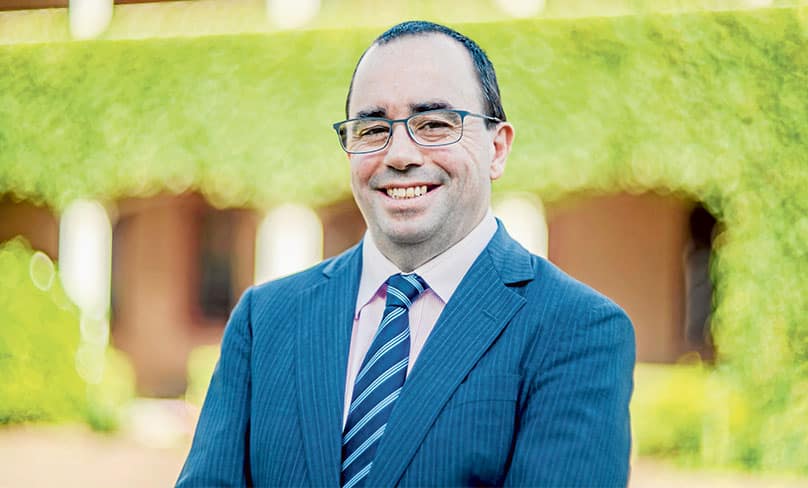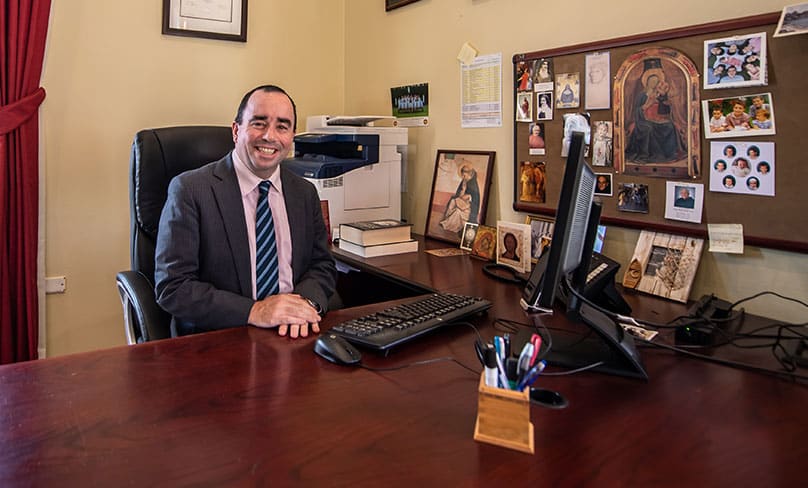
By Shaun Hyatt
1. What does the Liberal Arts Mean to you?
The Liberal Arts are a study in freedom rightly understood: a freedom from ignorance, falsehood, irrationality and a freedom for understanding and living what is true, good and noble.
2. Who are your literary influences?
As a theologian I should speak more about theological/philosophical writers. Big heroes of mine include, among many others: Aquinas, Augustine, Pinckaers, Balthazar, Newman and Ratzinger. Writers that have affected me include, among many, many others: Evelyn Waugh, Flannery O’Connor, Clive James, Tom Wolfe, G.K. Chesterton, C.S. Lewis, Malcolm Muggeridge, PD James, and Charles Dickens. If we can stretch the question to popular culture: Bob Dylan, the films of the Coen brothers and Terrance Malick.
3. What has been your favourite thing about being president of a Liberal Arts College?
Seeing students flourish in an environment that values learning, culture, faith, virtue and friendship.
4. If you were stuck on a deserted island with three books to read, which ones would you bring?
I’m not sure this is how you are meant to answer this question, but one criterion would be large books! Holy Bible, Thomas Aquinas’ Summa Theologiae, and, to have some respite from just looking at beaches and forests, a coffee table book of great art.
5. How important do you think the Liberal Arts are today? What do you think you can gain from it?
Very important, because an authentic liberal education helps us understand who we are in times that are rapidly changing. Today, when identity and what it means to be human are challenged, a liberal arts education gives one a grounding in authentic humanism. A Catholic liberal arts education extends that further into an authentic Christian humanism. What do you gain? In the sense of knowing and understanding all the best that has been thought, written, lived and fought for, you gain an education in true wisdom.
6. What is something that really annoys you?
Red tape bureaucracy.
7. Would you want your children to do a Liberal Arts Course?
Absolutely!
8. How do you relax? Why do you like this?
At home with my wife and children: reading, playing & watching sport, prayer, gardening, films.
9. If there was anything you’ve always wanted to do but never got around to doing, what is it?
Visit Mont St Michel and take my wife to Venice.

10. Who do you think is one of the most important writers?
In the Catholic context I think John Henry Newman and Joseph Ratzinger are perhaps the most important in our present age. Both are modern thinkers grounded in tradition. Thomas Aquinas is perennially important.
11. Which Literature character, or philosopher/historian, do you most relate to?
Not so much relate, but I aspire to Aquinas and Chesterton’s sense of wonder at reality.
12. If you could ask any author/philosopher/historian a question and get an answer, who would it be and what would you ask?
To C.S. Lewis: How close were you to ‘crossing the Tiber?’
13. What do you think of Australia’s current generation of students?
Like all generations they are inquisitive, but they are burdened with unparalleled distraction in the form of the computers they carry around in their pockets. Technology has been great for information at your fingertips but disastrous for deep thinking and learning.
14. How important do you think the Liberal Arts are in relation to faith?
The Liberal Arts must connect with faith at least to the degree that they incorporate the study of big questions: what is a good life? Why is there something and not nothing? Does God exist? Etc. I would argue that a Liberal Arts education is an extremely important way to understand and grow in the Catholic faith. We believe all that is true is found in and comes from God. The truth is integrated, broad and deep; it is not narrow, or shallow. To see the glory of God in all things is at the heart of a Catholic vision of education.
15. If you were Prime Minister of Australia, what is the first thing you would do?
I would, very tentatively, seek to introduce national public holidays for major Christian feast days – at least for the Ascension! This should motivate the bishops to restore the celebration of the Ascension back to its rightful place! I would then turn to education policy …
16. What problems do you think the liberal Arts face today?
The liberal arts are simply not valued as they ought to be. So much of the modern approach to education is about success (mostly ill-defined) and is riddled with ideologies that see learning as a pathway to change and political identity. You only have to look at the controversy surrounding the Ramsay Centre for Western Civilisation to see how maligned a classical approach to the liberal arts is in the humanities departments of our universities. I also think there is, more broadly, an undervaluing of wisdom in education today.
17. Who is your patron Saint, and why did you pick them?
My name is my patron so I believe St Paul chose me and not the other way around!
18. Is there anything you would say to students considering undertaking a Liberal Arts Course?
I would say, like the old Nike slogan: Just do it! A liberal arts education is a real point of difference today in whatever path your life may take. It is a point of difference that will enable you to integrate ideas, solve problems, think critically, respect and understand human dignity, understand society and work for the common good. For good reason, employers and graduate programs really want and value liberal arts graduates.
